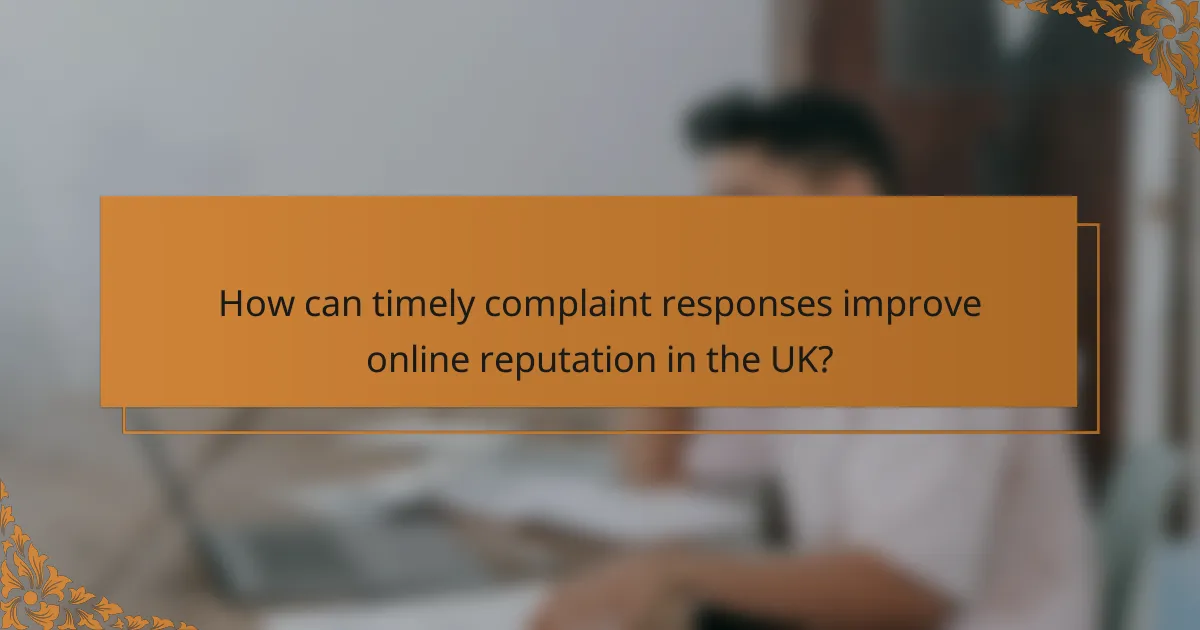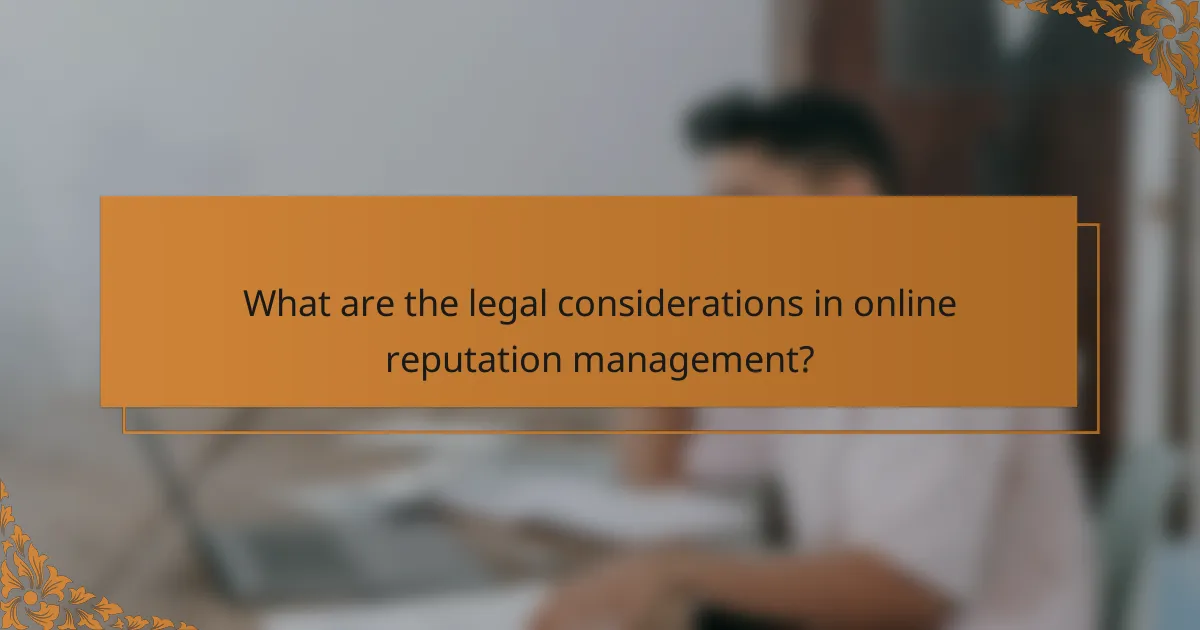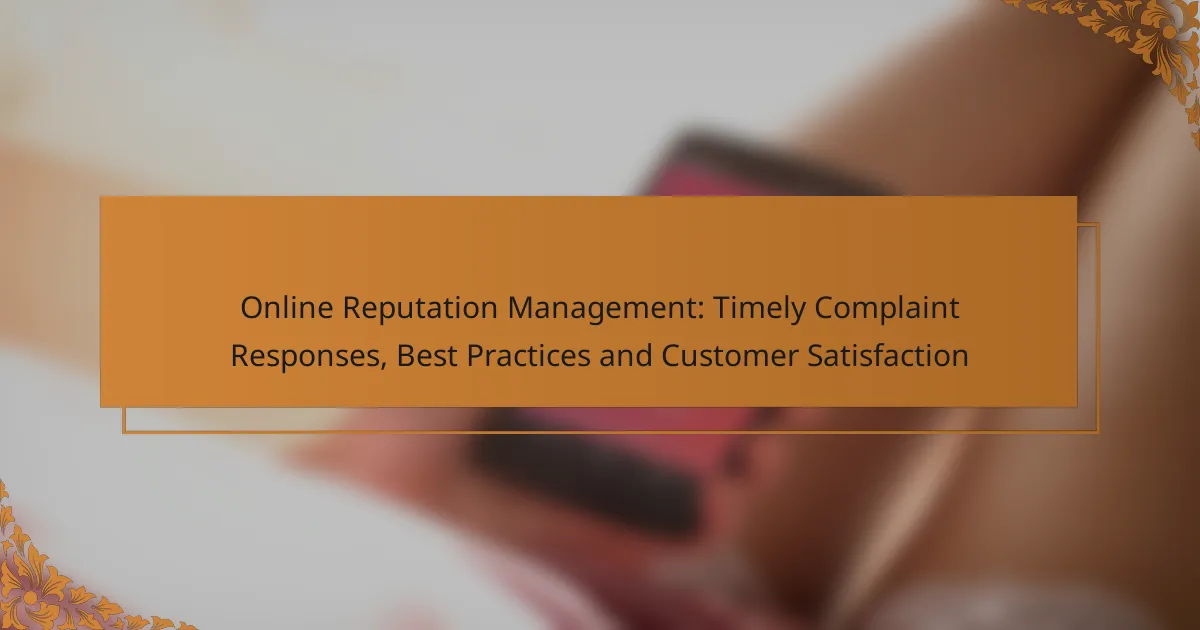In today’s digital landscape, timely responses to customer complaints are essential for enhancing a company’s online reputation. By addressing concerns quickly and thoughtfully, businesses can foster trust and loyalty, which are vital for maintaining a positive public image. Implementing best practices in online reputation management, such as proactive monitoring and consistent messaging, further strengthens brand perception and customer satisfaction.

How can timely complaint responses improve online reputation in the UK?
Timely responses to complaints can significantly enhance a company’s online reputation in the UK by demonstrating commitment to customer service. Quick resolutions not only address customer concerns but also foster trust and loyalty, which are crucial for maintaining a positive public image.
Faster resolution leads to higher customer satisfaction
When complaints are resolved quickly, customers feel valued and appreciated, which directly boosts their satisfaction levels. Research indicates that addressing issues within a few hours can lead to satisfaction rates exceeding 80% among customers.
To achieve faster resolutions, businesses should implement efficient complaint management systems that prioritize urgent issues. For example, using automated responses to acknowledge complaints can buy time while the issue is being investigated.
Positive engagement reduces negative sentiment
Engaging positively with customers who have raised complaints can mitigate negative sentiment and even turn dissatisfied customers into advocates. A simple thank you for their feedback, followed by a personalized response, can shift the narrative from negative to positive.
Companies should aim to respond within a few hours to show they care. Regularly monitoring social media and review platforms can help identify complaints early, allowing for proactive engagement that enhances reputation.

What are the best practices for online reputation management?
The best practices for online reputation management involve proactive strategies to monitor and respond to customer feedback, ensuring a positive brand image. Key elements include regular review monitoring and maintaining consistent messaging across all platforms.
Regular monitoring of online reviews
Regularly monitoring online reviews is crucial for understanding customer sentiment and addressing issues promptly. Set up alerts for new reviews on platforms like Google, Yelp, and social media to stay informed about what customers are saying.
Consider dedicating a specific team or individual to handle this task, ensuring they can respond quickly. Aim to check reviews at least weekly, but daily monitoring is ideal for businesses with high customer interaction.
Consistent brand messaging across platforms
Consistent brand messaging across platforms helps build trust and recognition among customers. Ensure that your tone, values, and key messages align on your website, social media, and review sites.
To achieve this, create a brand guideline document that outlines your messaging strategy. Regularly review and update your content to reflect any changes in your brand’s direction or customer expectations.

How should businesses respond to negative reviews?
Businesses should respond to negative reviews quickly and thoughtfully to mitigate damage to their online reputation. A timely response demonstrates that the business values customer feedback and is committed to resolving issues.
Acknowledge the issue promptly
Prompt acknowledgment of a negative review is crucial. Responding within a few hours to a couple of days shows customers that their concerns are taken seriously. This quick action can help prevent further escalation and may even turn a dissatisfied customer into a loyal one.
When acknowledging the issue, be sure to thank the reviewer for their feedback. This sets a positive tone and indicates that you are open to dialogue. For example, you might say, “Thank you for bringing this to our attention. We’re sorry to hear about your experience.”
Offer a solution or compensation
After acknowledging the issue, offering a solution or compensation can significantly improve customer satisfaction. Solutions may include a replacement product, a discount, or a refund, depending on the situation. Tailoring the response to the specific complaint can enhance the effectiveness of your resolution.
Consider creating a simple checklist for your team to follow when responding to negative reviews. This might include steps like assessing the complaint, determining appropriate compensation, and following up with the customer after the resolution. For instance, if a customer received a defective item, you could offer a replacement and a discount on their next purchase.

What tools can assist in managing online reputation?
Several tools can effectively assist in managing online reputation by monitoring brand mentions, analyzing sentiment, and facilitating timely responses to customer feedback. Utilizing these tools can help businesses maintain a positive image and enhance customer satisfaction.
Google Alerts for monitoring mentions
Google Alerts is a free tool that allows businesses to monitor their online presence by sending notifications whenever their brand is mentioned across the web. Users can set alerts for specific keywords, including their company name, product names, or relevant industry terms.
To maximize the effectiveness of Google Alerts, set up alerts for variations of your brand name and common misspellings. This proactive approach ensures you stay informed about both positive and negative mentions, enabling timely responses to customer feedback.
Reputation management software like Reputation.com
Reputation management software, such as Reputation.com, provides comprehensive solutions for monitoring and improving online reputation. These platforms often include features like review management, social media monitoring, and analytics to track sentiment over time.
When selecting reputation management software, consider factors such as ease of use, integration capabilities with existing systems, and pricing structures. Many platforms offer tiered pricing based on features, so evaluate your specific needs to choose the best option for your business.

What role does customer feedback play in reputation management?
Customer feedback is crucial in reputation management as it provides insights into public perception and highlights areas needing attention. By actively collecting and analyzing feedback, businesses can enhance their reputation and improve customer satisfaction.
Identifies areas for improvement
Customer feedback serves as a direct line to understanding what aspects of a business may be lacking. It can reveal specific issues, such as product quality or service delays, that may not be apparent from internal assessments. Regularly reviewing feedback allows companies to pinpoint these weaknesses and prioritize improvements.
For example, if multiple customers report long wait times, a business can investigate its service processes and implement changes to reduce delays. This proactive approach not only addresses concerns but also demonstrates a commitment to quality.
Enhances customer loyalty through engagement
Engaging with customers based on their feedback fosters a sense of community and loyalty. When businesses respond to complaints or suggestions, it shows customers that their opinions are valued, which can lead to increased retention rates. Acknowledging feedback can turn a negative experience into a positive one.
For instance, a company that promptly addresses a complaint and offers a resolution, such as a discount or replacement, is likely to retain that customer. This kind of engagement can significantly enhance customer loyalty and encourage positive word-of-mouth, which is vital for reputation management.

What are the legal considerations in online reputation management?
Legal considerations in online reputation management involve understanding defamation laws and compliance with data protection regulations. Businesses must navigate these areas carefully to avoid legal repercussions while managing their online presence.
Understanding defamation laws in the UK
Defamation laws in the UK protect individuals and organizations from false statements that could harm their reputation. A statement is considered defamatory if it lowers the person’s reputation in the eyes of right-thinking members of society.
To prove defamation, the claimant must show that the statement was false, damaging, and not covered by a defense such as truth or honest opinion. Businesses should be cautious when responding to online complaints to avoid making statements that could be construed as defamatory.
Compliance with data protection regulations
In the UK, businesses must comply with the General Data Protection Regulation (GDPR) when managing online reputations. This includes ensuring that personal data is processed lawfully, transparently, and for specific purposes.
When responding to complaints, companies should avoid disclosing personal information without consent and ensure that any data shared is necessary for the context. Regular training on data protection for staff involved in reputation management can help mitigate risks associated with non-compliance.

How can businesses measure the effectiveness of their reputation management efforts?
Businesses can measure the effectiveness of their reputation management efforts by tracking customer sentiment and analyzing review ratings over time. These metrics provide insights into how well a company is perceived and highlight areas for improvement.
Tracking changes in customer sentiment
Tracking changes in customer sentiment involves monitoring feedback across various platforms, including social media, review sites, and customer surveys. Tools like sentiment analysis software can help quantify emotions expressed in customer comments, allowing businesses to identify trends and shifts in perception.
Regularly assessing sentiment can reveal the impact of specific actions, such as responding to complaints or launching new products. For instance, a positive spike in sentiment following a timely response to a negative review can indicate effective reputation management.
Analyzing review ratings over time
Analyzing review ratings over time helps businesses understand their performance and customer satisfaction levels. By examining trends in ratings on platforms like Google, Yelp, or Trustpilot, companies can gauge whether their reputation is improving or declining.
It’s beneficial to track ratings monthly or quarterly, looking for patterns that correlate with marketing campaigns, product launches, or service changes. For example, if ratings drop after a new service rollout, it may signal the need for adjustments or additional training for staff.

What emerging trends are shaping online reputation management?
Emerging trends in online reputation management are increasingly driven by technology and consumer behavior. Key developments include the use of artificial intelligence for sentiment analysis and the rising significance of social media engagement in shaping public perception.
Increased use of AI for sentiment analysis
The integration of AI in sentiment analysis allows businesses to monitor and interpret customer opinions at scale. This technology can analyze vast amounts of data from reviews, social media, and forums to gauge public sentiment, helping companies respond proactively to negative feedback.
Companies should consider implementing AI tools that provide real-time insights into customer sentiment. For instance, using platforms that aggregate reviews and social media mentions can help identify trends and potential issues before they escalate.
Growing importance of social media engagement
Social media engagement has become crucial for managing online reputation, as consumers increasingly turn to these platforms for feedback and interaction. Businesses that actively engage with customers on social media can build trust and mitigate negative perceptions more effectively.
To enhance social media engagement, companies should respond promptly to comments and messages, addressing concerns directly. Regularly sharing positive content and customer success stories can also help reinforce a favorable image. Avoiding long response times is essential, as delays can lead to dissatisfaction and further damage to reputation.
